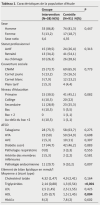Impact of therapeutic education on quality of life in coronary patients: Interventional study
- PMID: 39564639
- PMCID: PMC11668160
- DOI: 10.62438/tunismed.v102i11.5299
Impact of therapeutic education on quality of life in coronary patients: Interventional study
Abstract
Aim: To determine the impact of a therapeutic patient education (TPE) program on the quality of life of coronary patients at the Sahloul University Hospital in Sousse.
Methods: an interventional study was conducted over a period of seven months from May 2022 to November 2022, with patients hospitalized in the cardiology department of the Sahloul University Hospital. Participants were divided into two groups, intervention and control. The task force benefited from a TPE program. The control group followed the usual consultations at the hospital. The health-related quality of life assessment was done three months after the end of the educational program, using the validated Tunisian version of SF-12.
Results: Of the 129 patients included, 38 followed the education program while 91 were in the control group. Sociodemographic characteristics revealed a male predominance in the study population, with a similar average age between the two groups. The main cardiovascular risk factors identified were smoking, hypertension and diabetes. This program has led to an improvement in the quality of life of patients. Thus, patients who participated in the TPE program had significantly higher scores than the control group in the headings of physical role, emotional role, body pain, social function, and physical health and mental health scores with statistically significant differences.
Conclusion: Our study highlights the crucial importance of therapeutic education in improving the health status and quality of life of coronary patients. It calls for its widespread integration into cardiovascular care protocols, highlighting its central role in a proactive and personalized approach to medical care.
Objectif: Déterminer l’impact d’un programme d’éducation thérapeutique du patient (ETP) sur la qualité de vie des patients coronariens au CHU Sahloul de Sousse. Méthodes: une étude interventionnelle a été menée durant une période de sept mois allant du mois de Mai 2022 à Novembre 2022, auprès des patients hospitalisés au service de cardiologie de l'Hôpital universitaire Sahloul. Les participants ont été répartis en deux groupes, intervention et contrôle. Le groupe d'intervention a bénéficié d'un programme d'ETP. Le groupe contrôle a suivi les consultations habituelles à l’hôpital. L’évaluation de la qualité de vie liée à la santé a été faite trois mois après la fin du programme éducatif, en utilisant la version tunisienne validée de SF-12. Résultats: Sur les 129 patients inclus, 38 ont suivi le programme d'éducation tandis que 91 étaient dans le groupe contrôle. Les caractéristiques sociodémographiques ont révélé une prédominance masculine dans la population étudiée, avec un âge moyen similaire entre les deux groupes. Les principaux facteurs de risque cardiovasculaire identifiés étaient le tabagisme, l'hypertension et le diabète. Ce programme a conduit à une amélioration de la qualité de vie des patients. Ainsi, les patients qui ont participé au programme d’ETP avaient des scores significativement plus élevés que le groupe témoin dans les rubriques du rôle physique, rôle émotionnel, douleur corporelle, fonction sociale, et des scores de santé physique et santé mentale avec des différences statistiquement significatives. Conclusion: Notre étude souligne l'importance cruciale de l'éducation thérapeutique dans l'amélioration de l’état de santé et de la qualité de vie des patients coronariens. Elle appelle à son intégration généralisée dans les protocoles de soins cardiovasculaires, mettant en avant son rôle central dans une approche proactive et personnalisée de la prise en charge médicale.
Keywords: Coronary artery disease; Intervention; Quality of life; Therapeutic patient education.
Figures
References
-
- World Health Organization Cardiovascular diseases (CVDs)
-
- World Health Organization Global health estimates: Leading causes of death
-
- Jemaa R, Razgallah R, Ben Ghorbel I, Rais L, Kallel A. Prevalence of cardiovascular risk factors in the Tunisian population: The ATERA survey. Arch Cardiovasc Dis Suppl. 2020;12(1):159.
-
- Jernberg T, Hasvold P, Henriksson M, Hjelm H, Thuresson M, Janzon M. Cardiovascular risk in post-myocardial infarction patients: nationwide real world data demonstrate the importance of a long-term perspective. Eur Heart J. 2015;36(19):1163–1170. - PubMed
Publication types
MeSH terms
LinkOut - more resources
Full Text Sources



